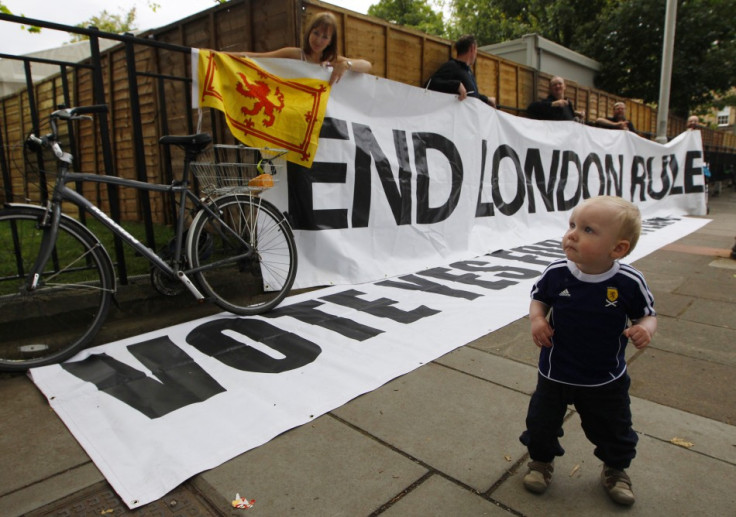Cameron, Referendum and Why Scotland's Insignificance in London is an Advantage [BLOG]

If you're ever looking for a textbook example of how and why London's strategies to thwart the Scottish national movement go awry with such uncanny consistency, look no further than David Cameron's announcement of an in/out referendum on Europe.
It forms part of a rich tradition of Westminster thinking, of the non-joined-up variety. It's as if the UK government thinks it has an airtight box labelled 'Scottish policy' in its possession, and all it has to do is come up with a strategy that is calibrated for the conditions within that box. The snag is, of course, that the box is not in fact airtight - it's wide, wide open, and entirely exposed to the effects of other decisions made by the government.
Margaret Thatcher, for instance, thought she could keep Scottish nationalism at bay simply by contemptuously rejecting every call for even the most modest forms of devolution. It doesn't sound like a great plan, but the irony is that it probably would have worked, if only her other policies had been benign in their impact on Scotland. Instead she annihilated our traditional industries, ripped the heart out of our communities, and imposed the hated poll tax.
During her reign, support for devolution went through the roof, and support for independence essentially doubled. And yet she would doubtless have been bemused to be told in the late 1990s that she had become known as 'the midwife of devolution', because it never would have occurred to her to take into account the Scottish consequences of British policy decisions. If those decisions weren't inside the 'Scottish box', why on earth should Scotland feel that they were in any sense relevant to the country's constitutional future?
To his credit, Tony Blair accepted that Scotland's brush with Thatcherism had rendered devolution inevitable, but he did so reluctantly, and at heart he remained every bit as much a one-dimensional unionist as his predecessor. He would be horrified to think of himself as 'the midwife of Scotland's independence referendum', and yet that's exactly what he was. By pursuing Tory-lite policies, and above all else by dragging Scotland into the illegal invasion of Iraq, he undid all the careful planning of a devolution settlement that was supposed to entrench unionist rule. Instead he caused traditional Labour voters to despair of their party and to flock to the SNP.
And now it's David Cameron's turn to fall into the same trap. Just a few weeks ago, he was patiently explaining to slow-witted Scots that he couldn't possibly budge an inch on further devolution, or even enter into a debate on it, until Scotland's in/out referendum on independence was over. We needed to get that question "out of the way first", he repeatedly stressed. He never actually got around to explaining why that particular sequence of events was such a necessity, although a few unkind souls suggested that he was planning to use a vague hint of 'jam tomorrow' to secure a No vote, and then to portray that No vote as proof that there was no appetite for further devolution. Perish the thought that anyone could be so cynical.
But wait, what's this? In his speech on the EU, the Prime Minister claimed that an in/out referendum now would be a "false choice". It was essential that a new package first be agreed that transferred powers from the EU to the UK, and only then could voters know: "What is it exactly that we are choosing to be in or out of?"
Well, quite. That "basic question" is one that Scottish voters will now be entitled to ask of the Prime Minister in our own in/out referendum next year, and he will no longer have any credibility in refusing to answer. But did he or his advisers notice that they were driving a coach and horses through the logic of their own Scottish position by using that form of words? It may seem incredible, but frankly I'm not sure they did.
By the same token, it's only a matter of weeks since unionist politicians were gloating about the supposed uncertainty over whether an independent Scotland would be allowed to remain within the EU.
In truth, the political reality is that Scotland's expulsion would be utterly unthinkable. But in a referendum campaign, perception matters more than reality, and it's at least arguable that the No campaign had enjoyed some success in sowing doubts in voters' minds on the question of EU membership. But that's just gone out the window as well. It's now plain for all to see that Scotland is at much greater risk of an enforced exit from the EU as part of the UK than it would be as an independent state. Did it occur to the Prime Minister or his advisers that they were throwing away one of their own trump cards in the Scottish referendum? Again, I have my doubts.
The reason for these comical blunders is of course that, deep down, London politicians don't regard Scotland and the 'beloved union' as particularly important - certainly not important enough to take account of in matters of high policy. It's rather a poetic irony, isn't it? Their strategic missteps speak most eloquently to the very reason why Scotland needs to be independent. In a nutshell, we just don't matter enough for them to get it right.
© Copyright IBTimes 2025. All rights reserved.




















